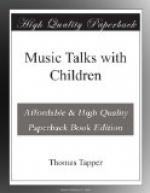A player who devotes the mind and the hands only to what a meaningless composer writes for them is not worthy of any power. With our hands in music, as with the tongue in speech, let us strive from the beginning to be truthful. Let us try in both ways to express the highest truth we are able to conceive. Then in art we shall, at least, approach near unto the true artist; and in life we shall approach near unto the true life. Every mere empty display-piece we study takes up the time and the opportunity wherein we could learn a good composition, by a master of the heart. And it is only with such music that you will, during your life, get into the hearts of those who are most worthy for you to know. Out of just this thought Schumann has two rules now very easy for us to understand:
“Never help to circulate bad compositions; on the contrary, help to suppress them with earnestness.”
“You should neither play bad compositions, nor, unless compelled, listen to them.”
We now come to a really definite conclusion about the compositions we should play and to an extent as to how we should play them.
The heart, the mind, and the hands, or the voice, if you sing, should unite in our music; and be consecrated to the beautiful. Consecrate is just exactly the word. Look for it in your dictionary.[37] It comes from two other words, does it not? Con meaning with and sacer meaning holiness. Thus devote heart and head and hands with holiness to the beautiful. This is very clear, I am sure.
It is also worth doing. “With holiness” describes how to play and really what to play. A composition which has been born of a true man is in thought already consecrated. He has heard it and felt it within himself. Daily you must get closer and closer to these messages and meanings. And are they not already more luminous to you? And do you remember what we said luminous means?
CHAPTER X.
THE LESSON.
“All people value most what has
cost them much labor.”
—Aristotle.[38]
It is true that music is beautiful and that it gives us happiness and comfort. But, nevertheless, music is hard to learn for every one; harder for some than for others, but hard for all. It is well and best that it should be so. We appreciate most highly that which we labor for earnestly. Just imagine if every one could sing or play merely by wishing it! Then music would be so common and so much the talent of all that it would cease to give us joy. Why? Because one gained it by a wish. That is not enough. From this can we learn to understand the great secret of it all? I think we can. Let us see! The secret is this: Music is a joy because it takes us out of ourselves and we work hard to get it. Music teaches us what a wonderful power there is within us, if we will only strive to bring it out. Education is good for us for this same reason. As you learn more and more about words, you will see more in this word Education.




